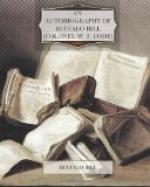I was a rich boy when I got to Leavenworth. I had nearly a thousand dollars to turn over to my mother as soon as I should draw my pay. After a joyful reunion with the family I hitched up a pair of ponies, and drove her over so that she could witness this pleasing ceremony. As we were driving home, I heard her sobbing, and was deeply concerned, for this seemed to me no occasion for tears. I was quick to ask the reason, and her answer made me serious.
“You couldn’t even write your name, Willie,” she said. “You couldn’t sign the payroll. To think my boy cannot so much as write his name!”
I thought that over all the way home, and determined it should never happen again.
In Uncle Aleck Majors’ book, “Seventy Years on the Frontier,” he relates how on every wagon-sheet and wagon-bed, on every tree and barn door, he used to find the name “William F. Cody” in a large, uncertain scrawl. Those were my writing lessons, and I took them daily until I had my signature plastered pretty well over the whole of Salt Creek Valley.
I went to school for a time after that, and at last began really to take an interest in education. But the Pike’s Peak gold rush took me with it. I could never resist the call of the trail. With another boy who knew as little of gold-mining as I did we hired out with a bull-train for Denver, then called Aurora.
We each had fifty dollars when we got to the gold country, and with it we bought an elaborate outfit. But there was no mining to be done save by expensive machinery, and we had our labor for our pains. At last, both of us strapped, we got work as timber cutters, which lasted only until we found it would take us a week to fell a tree. At last we hired out once more as bull-whackers. That job we understood, and at it we earned enough money to take us home.
We hired a carpenter to build us a boat, loaded it with grub and supplies, and started gayly down the Platte for home. But the bad luck of that trip held steadily. The boat was overturned in swift and shallow water, and we were stranded, wet and helpless, on the bank, many miles from home or anywhere else.
Then a miracle happened. Along the trail we heard the familiar crack of a bull-whip, and when the train came up we found it was the same with which we had enlisted for the outward journey, returning to Denver with mining machinery. Among this machinery was a big steam-boiler, the first to be taken into Colorado. On the way out the outfit had been jumped by Indians. The wagon boss, knowing the red man’s fear of cannon, had swung the great boiler around so that it had appeared to point at them. Never was so big a cannon. Even the 42-centimeter howitzers of today could not compare with it. The Indians took one look at it, then departed that part of the country as fast as their ponies could travel.
We stuck with the train into Denver and back home again, and glad we were to retire from gold-mining.




